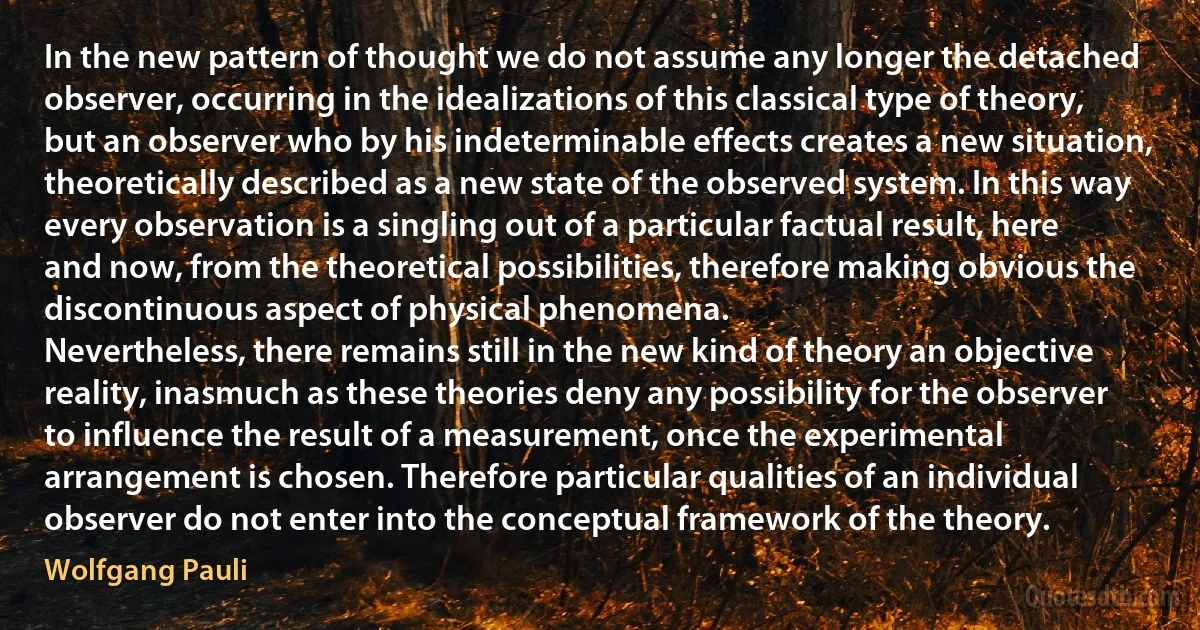
In the new pattern of thought we do not assume any longer the detached observer, occurring in the idealizations of this classical type of theory, but an observer who by his indeterminable effects creates a new situation, theoretically described as a new state of the observed system. In this way every observation is a singling out of a particular factual result, here and now, from the theoretical possibilities, therefore making obvious the discontinuous aspect of physical phenomena. Nevertheless, there remains still in the new kind of theory an objective reality, inasmuch as these theories deny any possibility for the observer to influence the result of a measurement, once the experimental arrangement is chosen. Therefore particular qualities of an individual observer do not enter into the conceptual framework of the theory.
Wolfgang PauliRelated topics
arrangement aspect classical enter experimental kind longer making measurement now objective observer occurring once possibility result singling situation state thought way remainsRelated quotes
We ought to be able to see more clearly just for what reason the mass-man is so easily turned into a fanatic. What I seem to myself to have grasped is this, that such permeability is due to the fact that man, that the individual, in order to belong to the mass, to be a mass-man, has had, as a preliminary, though without having had the least awareness of it, to divest himself of that substantial reality which was linked to his initial individuality or rather to the fact of his belonging to a small actual group. The incredibly sinister role of the press, the cinema, the radio, has consisted in passing that original reality through a pair of flattening rollers to substitute for it a superimposed pattern of ideas and images with no real roots in the deep being of the subject of this experiment.

Gabriel Marcel
General systems theory, in a sense, is no news at all, as Von Foerster found out when he attempted to organize a conference of general systems people and anthropologists. In a sense, the situation is comparable to that found by the Committee for the Study of Mankind, in which a committee that included Robert Redfidd tried to get each discipline to consider its relationship to the concept of Mankind. Anthropologists replied, "we are related already," and so they were. Something similar may be said of attempts to date in mathematical anthropology. The kind of information that a computer program can finally provide, on a level of a particular culture, is simply a reflection of how detailed field work has been done, and to the careful field worker, on kinship, for example, it provides no illumination.

Margaret Mead
I adopt Mr. Darwin's hypothesis, therefore, subject to the production of proof that physiological species may be produced by selective breeding; just as a physical philosopher may accept the undulatory theory of light, subject to the proof of the existence of the hypothetical ether; or as the chemist adopts the atomic theory, subject to the proof of the existence of atoms; and for exactly the same reasons, namely, that it has an immense amount of primâ facie probability: that it is the only means at present within reach of reducing the chaos of observed facts to order; and lastly, that it is the most powerful instrument of investigation which has been presented to naturalists since the invention of the natural system of classification and the commencement of the systematic study of embryology.

Thomas Henry Huxley
The need for a fundamentally different approach to the study of physical processes at the molecular level motivated the development of relevant statistical methods, which turned out to be applicable not only to the study of molecular processes (statistical mechanics), but to a host of other areas such as the actuarial profession, design of large telephone exchanges, and the like. In statistical methods, specific manifestations of microscopic entities (molecules, individual telephone sites, etc.) are replaced with their statistical averages, which are connected with appropriate macroscopic variables. The role played in Newtonian mechanics by the calculus, which involves no uncertainty, is replaced in statistical mechanics by probability theory, a theory whose very purpose is to capture uncertainty of a certain type.

George Klir
It should be clear by now that there are people who can, in fact, be reasonably considered experts; that it is rational to rely, within limits, on ex pert opinion; and that it is possible, by exercising relatively simple criteria, to gain insight into whether a particular expert is reliable or not. It is also true that experts, of course, do make mistakes, and that even the agreement of a large majority of experts in a field does not guarantee that they got it right. That's the nature of scientific truth, as we have seen throughout this book: it is tentative, because it is the result of a human endeavor that is limited both by the type and amount of available evidence and by humans' finite mental powers and emotional reactions. But the examples above show how you can, with a little bit of practice, tell science from bunk!

Massimo Pigliucci
